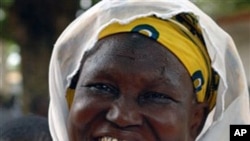For the first time in Ivory Coast, women voters outnumber men. Political parties and election authorities are working to make sure those women go to the polls Sunday for the country's long-delayed presidential election.
Women represent more than 60 percent of registered voters in Ivory Coast and are increasingly a force to be reckoned with in the country's politics.
It is a trend that has not been lost on the country's 14 presidential hopefuls. Many have promised reforms attractive to women, including laws that would guarantee them one-third of decision-making posts in government.
With just four days to go before the poll, women supporters of current president and candidate, Laurent Gbagbo, hit the streets of Abidjan to drum up support among women voters.
Head of the group, Women for Laurent Gbagbo, Genevieve Bro-Grebe, says they have been all over the country to sell their product, their candidate. She says they have met with nurses, midwives, teachers, recently naturalized citizens, hairstylists and make-up artists.
She says 70 percent of women in Ivory Coast are illiterate. It is difficult for them to vote, she says, so this week, they are going door-to-door to show them how to cast their ballot.
Reading and writing are not the only barriers for female voters.
Marie Paule Kodjo runs the Ivorian nonprofit, the Women's Committee for Elections and Reconstruction, which was instrumental in helping women register to vote nationwide. She says stereotypes and poverty play a role.
Kodjo says women have been told that it is their father or husband who will tell them who to vote for. She says they have been working so women understand that voting is a personal choice and that they should choose a candidate not based on family, gender or ethnicity, but on his or her program. Some women, she says, especially outside Abidjan, do not have the money to vote or to pick up identity and voter cards. She says some women in areas affected by the war are scared to vote because men have threatened them if they do not vote for a certain candidate.
The committee's educators have also been touring Abidjan's markets. It is a non-partisan effort aimed at making sure women's votes are not thrown out for technical reasons.
For example, at this market in the low-income neighborhood of Wassaka, educators are teaching female street vendors how to properly fold the ballot after marking their candidate so the ink will not smudge into multiple boxes, rendering the vote invalid.
But educators say the effort is also about giving women confidence, a first step to one day getting more women in local and legislative offices that they say are still dominated by men.
The leader of Wassaka's market women, Natogoman Coulibaly, says life has gotten more difficult, especially for the poor, and it is time for women's voices to be heard.
She says they showed her how to vote and she is happy. She says she did not plan to vote, but now she is working with them to encourage other women.
The presidential election is meant to end nearly a decade of political crisis after a 2002-2003 civil war.
Kodjo says the political situation for women is changing, largely because of the crisis Ivory Coast has experienced during which women suffered enormously. She says they lost their husbands and their children. She says they have been raped and attacked. Now, she says, women are saying, "enough," that it is time to be brave and get out in front.
At the polls Sunday, Ivorians will even be able to vote for the country's first female presidential candidate, Jacqueline Oble.
But no matter who wins, political activists say women are set to play a strong political role in the rebuilding of Ivory Coast.
Ivorian Women Urged to Vote Sunday




